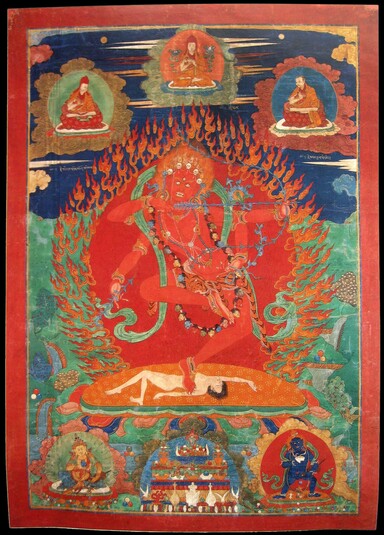
Item: Kurukulla (Buddhist Deity)
| Origin Location | Tibet |
|---|---|
| Date Range | 1500 - 1599 |
| Lineages | Sakya, Ngor (Sakya) and Buddhist |
| Size | 101.60x72.39cm (40x28.50in) |
| Material | Ground Mineral Pigment on Cotton |
| Collection | Asian Art Museum of San Francisco |
| Catalogue # | B72D60 |
Classification: Deity
Kurukulla (Tibetan: rig che ma. English: The One of the Action Family): Goddess of Power.
With one face, three eyes, dark yellow hair flowing upward and four hands, she has a slightly fierce and slightly peaceful expression. Held in the first pair of hands is a bow and arrow and in the second a hook in the right and lasso in the left. All the objects held in the hands are made of red utpala flowers and are used as implements of subjugation. Adorned with a tiara of skulls, earrings, bracelets and a necklace of fifty heads she wears a tiger skin as a skirt. Standing with the right leg drawn up in a dancing posture and the left leg pressing on a corpse above a sun disc and lotus seat she is completely surrounded by a circle of flames of pristine awareness.
At the top center is Ngorchen Kunga Zangpo with the hands in the teaching gesture holding to flower blossoms supporting a vajra and bell. On the viewers left is the Vajra Holder Konchog Pelwa. On the right side is Lord Sanggye Rinchen. Both teachers hold a folio book in the left hand.
There are numerous forms and lineages of Kurukulla arising from the Kriya and Anuttarayoga classes of Buddhist tantra of the New (Sarma) traditions and many forms from the 'Terma' (Revealed Treasure) discoveries of the Nyingmapa Tradition. She can appear peaceful or semi wrathful and in a range of colours from white, pink and blue to her more typical red colour. In the Kriya tantras she is often portrayed, but not exclusively, as a red power emanation of Tara. However, most forms of red Tara are not Kurukulla. In Anuttarayoga, from the Hevajra and Vajrapanjara Tantras, she is a power emanation of Shri Hevajra.
Jeff Watt 4-2009
Collection of Asian Art Museum of San Francisco
Buddhist Deity: Kurukulla Main Page
Painting Tradition: Menri Main Page
Painting Tradition: Menri Deities Page (15/16th Century)

